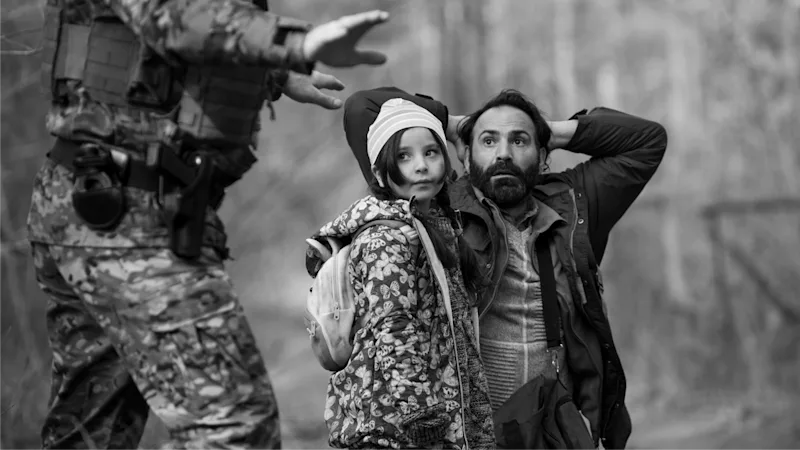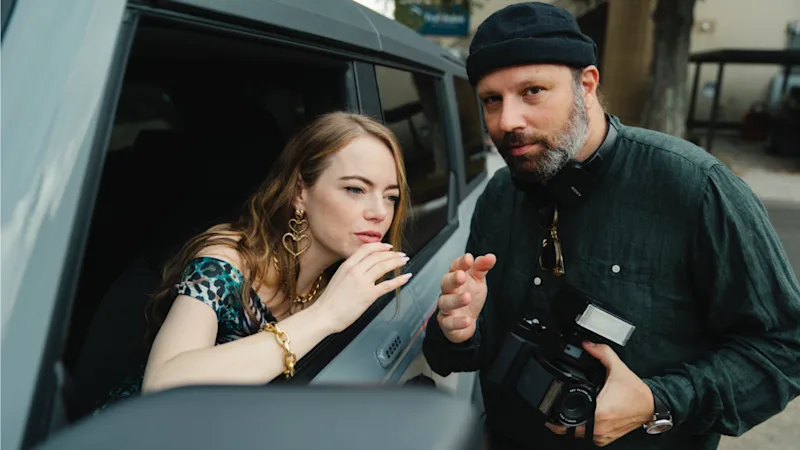No filmmaker loves a routine more than Paul Schrader. The Michigan-born writer and director, who was raised in a strict Calvinist family, has been telling stories about men with precise daily routines since his earliest days in Hollywood. "It really started with Taxi Driver," he tells A.frame. The 1976 classic marked the first professional collaboration between Schrader and director Martin Scorsese, who came up together as part of the New Hollywood wave of the 1970s.
Taxi Driver also marked the beginning of Schrader's decades-spanning fascination with characters who find both enlightenment and alienation in their daily patterns. "It has to do with waiting," Schrader says of what draws him to these characters' personal programs. "The illusion that something will happen."
“In Taxi Driver, Travis" — Robert De Niro's character — "writes, 'Every day is like every day before. Day after day, and then there is a change.' There's a sense that something will happen in the film," explains the filmmaker. "If you keep the audience interested long enough, they'll be tempted to leave. But they'll also know that if they leave, something will happen."
Schrader brought this slow-burn approach to his three most recent films — 2018's First Reformed, 2021's The Card Counter, and this year's Master Gardener — which make up the director's "Man in a Room" trilogy. It's a trilogy that, according to Schrader, came about unintentionally. "I'm always looking for certain kinds of stories, but it just so happened that I ended up making three similar films in a row."
Schrader experienced a late-career resurgence with First Reformed, about a minister (played by Ethan Hawke) who begins to question his own faith, for which he received his first-ever Oscar nomination. (For Best Original Screenplay.) Now, five years later, the trilogy that began with First Reformed comes to a close in Master Gardener.

Master Gardener's thematic connections to First Reformed and The Card Counter are obvious from the start. Like those films, the drama focuses on one man, Joel Edgerton's Narvel Roth, who writes his thoughts down in a journal every night. By day, he works as a horticulturist at an estate run by the wealthy Norma Haverhill (Sigourney Weaver). When Narvel is asked to train Norma's grand-niece, Maya (Quintessa Swindell), the foundations of his strictly-regimented life begin to shake, and the sins of his past threaten to resurface.
"I've found myself drawn to certain occupational metaphors," Schrader says, noting this has been true since Taxi Driver. "Back then, a cabbie was seen as a kind of wisecracker. He was like your brother-in-law. I looked at him and said, 'No. That's the isolated man. That's the man in the yellow coffin floating through the sewers of the city getting angrier and angrier."
On paper, Narvel perhaps shares more in common with William Tell, the former military interrogator played by Oscar Isaac in The Card Counter, than he does with Ethan Hawke's grieving Reverend Ernst Toller in First Reformed. However, all three men are bound together by similar internal conflicts and their unwavering dedication to their careers.
"When you take an occupation that people think they know and move it into a slightly different place, you get a nice tension. That tension between expectation and actuality is where art lives," Schrader explains. "The thing about gardening is that it's a nice two-faced metaphor. On the one hand, it's full of kindness and light and beauty. On the other hand, it's full of violence."
"It has to do with waiting... If you keep the audience interested long enough, they'll be tempted to leave. But they'll also know that if they leave, something will happen."
Narvel pays close attention to both the beauty of his craft and the carnage of his past. Like so many of Schrader's anti-heroes, he's a man who has spent his life waiting for some kind of redemption — or punishment. He gets a bit of both when Swindell's Maya enters the picture, a meeting that calls to mind Reverend Toller's first conversation with Amanda Seyfried's Mary in First Reformed, or Travis Bickle's first encounter with Jodie Foster's young Iris in Taxi Driver.
The unexpected, perverse romance that blossoms between Maya and Narvel is at the very center of Master Gardener, and Schrader is aware of the taboo nature of the relationship. Not only is there a considerable age gap between the two characters, but Narvel's white supremacist past makes his romance with Maya, a biracial woman, all the more complex.
"Their relationship is full of supposed taboos, and there's a real potential for difference between them," Schrader says. "That’s one of the things movies can do extraordinarily well: If you put two dissimilar people in the same context, and you create the right pacing and the right mood, viewers will start making a connection between them, and that's always what you're after."
"Film is a very passive medium. You don’t have to do anything to know how to feel; you just have to stay awake usually," he adds. "But if you can get the viewer to inhabit an unfamiliar, uncomfortable space and start making those connections, you can really affect someone in a way that most movies do not want to."

While it exists in a grounded world, Master Gardener engages in moments of fantasy that echo sequences in First Reformed and The Card Counter. These instances of surreality are partly why Schrader sees the three films as one trilogy. "That started with First Reformed, because the man in that film is trying to contact God and I wanted to show how this other world, the world of the spiritual and transcendent, is all around us," he notes.
"I thought, 'What can I do to show Toller and Mary that they are on the cusp of another world?' And I decided that they should just levitate and fly around the Earth," Schrader explains. "With Master Gardener, I wanted to try to transcend the oddity of this whole thing, and I just thought, 'The world will come alive! It will come into bloom.'"
Master Gardener premiered at last year's 79th Venice International Film Festival, where Schrader was hailed as "one of the most important American filmmakers of his generation" and awarded the Golden Lion for Lifetime Achievement. Looking forward, he plans to leave the themes and motifs of the "Man in a Room" trilogy behind in his next film. "It won't be similar to these three," he promises.
Even if Schrader does one day return to his repressed men and their strict routines, his decision to turn away from them for the time being reflects the arc his own career has taken over the past 50 years. In many ways, he feels creatively freer than he ever has. "I was one of the first writers to begin writing on spec," he says, "and now it looks like I'll also be one of the last. Still, the filmmaker appears optimistic about the state of both his career and the industry at large. "It's actually easier now to make these films than it was before."
"You don't get as much money," Schrader admits, "but you do get more freedom."
By Alex Welch
RELATED CONTENT:
Paul Schrader: 5 Movies That Liberated Me as a Filmmaker






